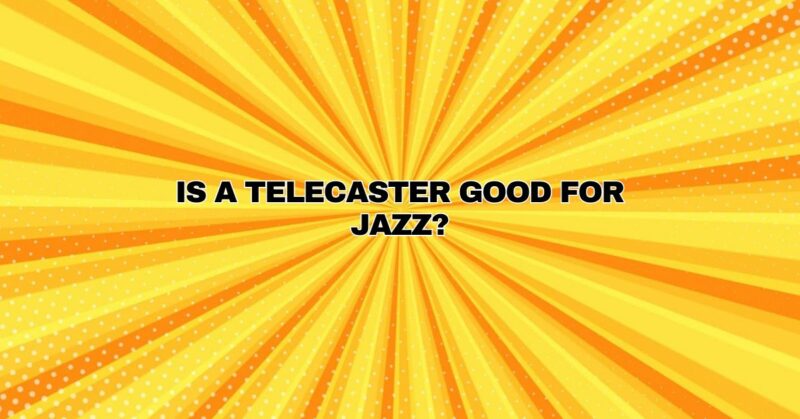When discussing jazz guitar, the Fender Telecaster might not be the first instrument that comes to mind. Traditionally associated with country, rock, and blues, the Telecaster has, in recent years, started to make a name for itself in the world of jazz. In this comprehensive article, we’ll delve into the question of whether a Telecaster is a good choice for jazz, exploring its unique characteristics, considerations, and the evolving role it plays in the genre.
The Telecaster’s Sonic Signature:
The Fender Telecaster is known for its distinct tonal qualities:
- Clarity and Articulation: Telecasters are celebrated for their clarity and articulation, particularly in the neck pickup position. This clarity allows jazz guitarists to express themselves with precision, an essential aspect of the genre’s intricate chord voicings and melodic phrasing.
- Warmth and Depth: While Telecasters are often associated with brightness and twang, the neck pickup on these guitars can produce warm, round, and inviting tones—perfect for jazz’s lush harmonies and melodies.
- Versatility: The Telecaster’s versatility extends beyond its traditional genres. It comfortably adapts to the diverse styles and subgenres within jazz, from traditional and smooth jazz to fusion and experimental jazz.
- Simplicity: With its minimalist design and straightforward controls, the Telecaster keeps distractions to a minimum. This simplicity allows jazz guitarists to focus solely on their playing technique and musical expression.
- Dynamic Range: Jazz relies heavily on dynamics—the subtle shifts in volume and intensity that convey emotion and depth. Telecasters, with their dynamic response, excel at translating the nuances of jazz playing.
Jazz Telecaster Considerations:
If you’re considering a Telecaster for jazz, here are some important factors to keep in mind:
- Pickup Selection: The neck pickup on a Telecaster is where the jazz magic happens. Look for models with neck pickups known for their warmth and roundness. Some Telecasters come equipped with specialized jazz pickups designed to enhance these qualities.
- Tonewood: Consider the tonewood used for the guitar’s body. Alder and ash are common choices for Telecasters. Alder offers a balanced and warm tone, while ash provides brightness. Your choice should align with your tonal preferences for jazz.
- Bridge Pickup: While the neck pickup is crucial, the bridge pickup also plays a role in shaping your overall tone. Telecasters are known for their twang in the bridge position, and this can be creatively incorporated into jazz playing for added character.
- String Choice: Experiment with string gauges and consider flatwound strings for a smoother, jazzier sound. String choice can significantly impact your Telecaster’s jazz tone.
- Amplification and Effects: Selecting the right amplifier and effects can further enhance your jazz tone. Clean amplifiers with good headroom are often preferred for jazz. Reverb, delay, and chorus effects can add depth and ambience to your sound.
- Playing Technique: Jazz guitar requires a unique set of techniques, including chord voicings, walking basslines, and melodic improvisation. Be prepared to adapt your playing technique to suit the Telecaster’s characteristics.
Telecaster Jazz Artists:
Several renowned jazz guitarists have embraced the Telecaster, demonstrating its capabilities in the genre:
- Bill Frisell: Known for his eclectic style, Bill Frisell has used Telecasters to explore a wide range of jazz styles, from traditional to avant-garde.
- Ed Bickert: Renowned Canadian jazz guitarist Ed Bickert often played a Telecaster in his smooth and lyrical jazz performances.
- John Pisano: John Pisano, a jazz guitarist known for his work with Herb Alpert and the Modern Jazz Quartet, has frequently used a Telecaster.
Conclusion:
While the Fender Telecaster may not be the most traditional choice for jazz guitar, it has proven itself as a versatile and compelling instrument for the genre. Its clarity, warmth, versatility, and simplicity have won over jazz guitarists looking to explore new tonal territories and express themselves in innovative ways. The Telecaster’s ability to bridge genres and its unique character have cemented its place in the ever-evolving landscape of jazz guitar. Whether you’re a traditionalist or an explorer of new sounds, a Telecaster can be a valuable tool for shaping your jazz identity and contributing to the rich tapestry of jazz music.


